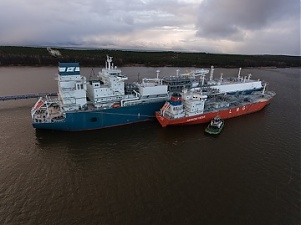Energy, Gas, Gas Market , Lithuania, Port, Transport
International Internet Magazine. Baltic States news & analytics
Saturday, 20.12.2025, 20:54
Estonian firms plan to further use Lithuanian LNG terminal
 Print version
Print version |
|---|
Darius Silenskis, who took up his new position a week ago, says the LNG market has changed fundamentally in recent years. Russian oil exports via Klaipeda have been on the decrease and Russian LNG imports, which started this year, account for a small part of the total LNG flow.
"We hear news that the LNG ship that will supply the Kaliningrad region is currently on its way to the United States, which is another signal that the LNG market is becoming liquid and more liberal, and that economic factors become key in selecting a supplier," the CEO told BNS in an interview.
"My personal opinion is that the presence or absence of strategic influence or potential strategic harm should not come into play when choosing a supplier," he said when asked if Lithuania should import Russian LNG.
"Simply put, if the country's (Russia's) resources made up the bulk of supplies and could potentially pose a threat to supplies to this region, then the issue may need to be given more emphasis and consideration."
A number of cargoes of Novatek gas from the Baltic Sea port of Vysotsk and one shipment from the Russian supplier's Yamal LNG terminal in Siberia have been delivered to Klaipeda since the start of the year.
Silenskis noted that Russia is not the main LNG supplier to Lithuania as it only accounts for a very low share of the total LNG transshipment volumes through the Klaipeda terminal.
Two Estonian companies – Eesti Energia and Eesti Gas – have started importing LNG via Klaipeda, but Latvia, which imports Gazprom gas, has been hesitant to do so.
Silenskis told BNS he could not say if Latvian companies have plans to purchase gas through Klaipeda.
"The fact that Estonia purchases gas shows their competitiveness and the benefits of our infrastructure for the region as a whole. I can't speak for the Latvians, but we have no restrictions as to bringing in another customer," the CEO told.
"I can't comment at the moment on whether Latvian companies or intermediaries are interested in supplying (LNG) to the Latvian market," Silenskis said.
"Estonia's companies are both using and have expressed their intention to continue using (the Klaipeda terminal), and may even increase quantities in the future. This will, of course, depend on the market situation," he added.
A specialist in maritime law, Silenskis had moved up the career ladder for 14 years before his recent appointment as Klaipedos Nafta's CEO.
Having started as an auditor at the Environment Ministry in 2005, he was later in charge of oil trading at Poland's Orlen Group, held the position of commercial director at Achemos Grupe's oil product handling company Kroviniu Terminalas, and was eventually appointed as oil business director at Klaipedos Nafta.








 «The Baltic Course» Is Sold and Stays in Business!
«The Baltic Course» Is Sold and Stays in Business!

